Glasgow coma scale score sheet pagbydesign

GCS smileandsemangat
The Glasgow Coma Scale provides a practical method for assessment of impairment of conscious level in response to defined stimuli. "The Glasgow Coma Scale is an integral part of clinical practice and research across the World. The experience gained since it was first described in 1974 has advanced the assessment of the Scale through the.
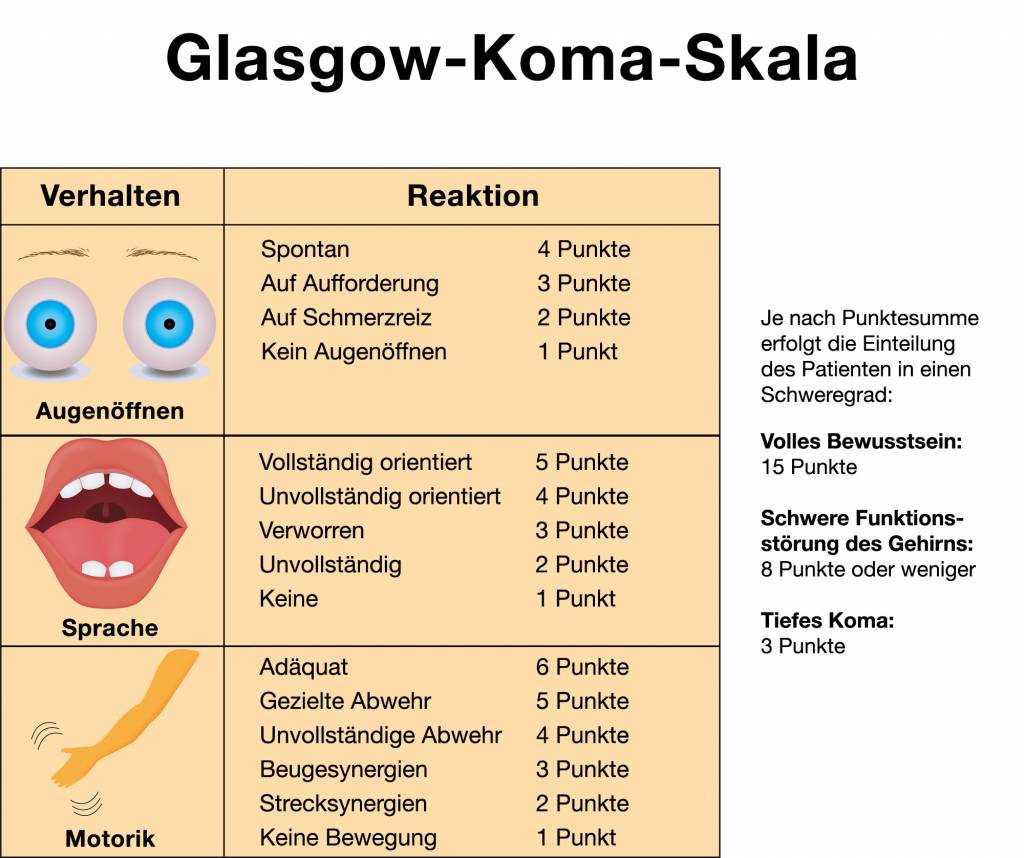
Glasgow Koma Skala Koma Die Wichtigsten Basics Zur Prufung Search nearly 13 million words
Introduction The Glasgow Coma Scale (GCS) provides a structured method for assessment of the level of consciousness. Its derived sum score is applied in research and adopted in intensive care unit scoring systems. Controversy exists on the reliability of the GCS. The aim of this systematic review was to summarize evidence on the reliability of the GCS. Methods A literature search was.

Glasgow Coma Scale Gcs Explained In Detail Caregiverology Images
Total. The GCS is scored between 3 and 15, 3 being the worst and 15 the best. It is composed of three parameters: best eye response (E), best verbal response (V), and best motor response (M). The components of the GCS should be recorded individually; for example, E2V3M4 results in a GCS score of 9. A score of 13 or higher correlates with mild.
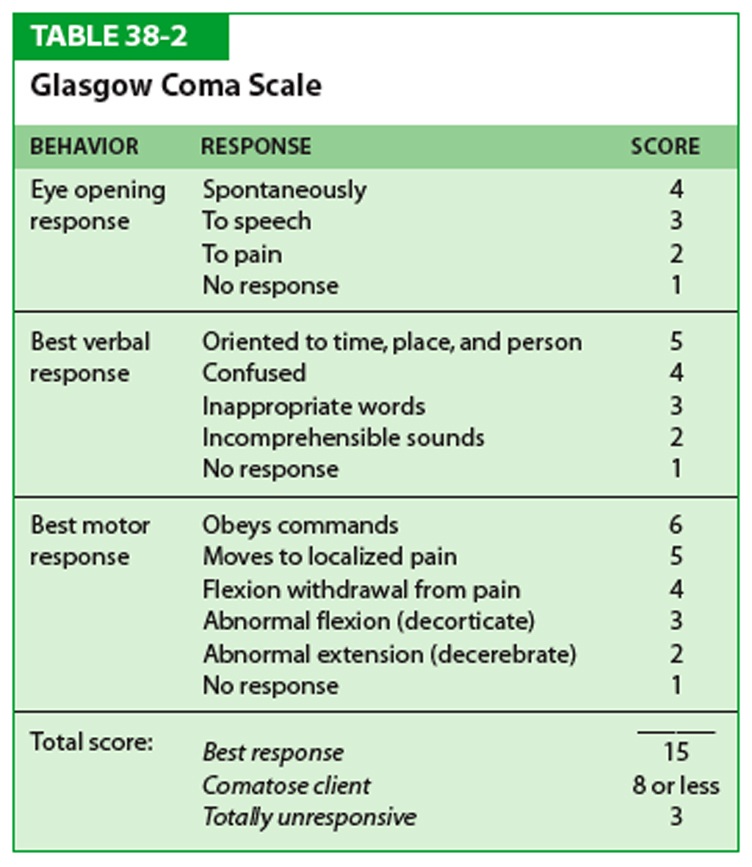
The Glasgow Coma Scale (GCS) for first aiders First Aid for Free
Introduction. The Glasgow Coma Scale (GCS), developed in 1974 by Teasdale and Jennett, 1 is the most widely used behavioral measure to assess the severity of acute traumatic brain injury (TBI). 2,3 The scale's simplicity and rapid assessment approach has led to its international adoption for both diagnostic and prognostic 4 applications in pre-hospital, emergency department (ED), and intensive.

Glasgow Coma Scale Range Images and Photos finder
The Glasgow Coma Scale (GCS), designed in 1974, is a tool that has the ability to communicate the level of consciousness of patients with acute or traumatic brain injury. Developed by Graham Teasdale and Bryan J. Jennett, professors of neurosurgery at the University of Glasgow's Institute of Neurological Sciences, this scale is the gold.

Die Glasgow Coma Scale Die Zwei in Reflexstreifen
Glasgow Coma Scale. Pro posouzení stavu vědomí je užívána stupnice Glasgowská stupnice hloubky bezvědomí, s modifikací pro děti. Pro posouzení stavu vědomí u dětí mladších 3 let je vypracována stupnice Best Possible Coma Score založená na posouzení maximálních schopností vzhledem k maturaci ( Reilly et all. ).

GCS Glasgow Coma Scale
The Glasgow Coma Scale was first published in 1974 at the University of Glasgow by neurosurgery professors Graham Teasdale and Bryan Jennett.[1] The Glasgow Coma Scale (GCS) is used to objectively describe the extent of impaired consciousness in all types of acute medical and trauma patients. The scale assesses patients according to three aspects of responsiveness: eye-opening, motor, and.
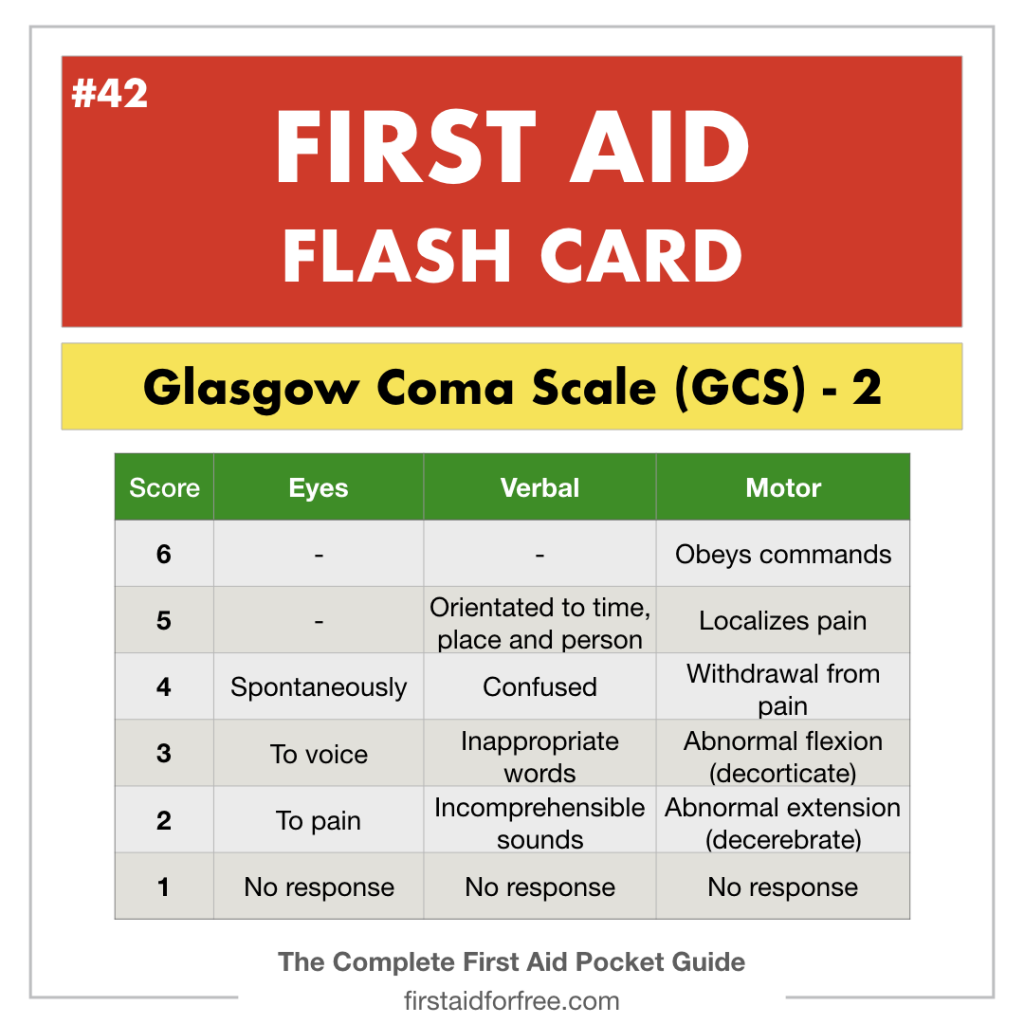
The Glasgow Coma Scale (GCS) for first aiders First Aid for Free
The Glasgow Coma Scale - Pupils score (GCS-P) was described in 2018 in response to the wish for a single index combing the Coma scale with pupillary reactivity as a reflection of brainstem function ( Journal of Neurosurgery 2018;128 : 1612-1620). It's possible values range from 1 to 15, reflecting an extended range of severity, and may be.

Printable Glasgow Coma Scale
A quick, easy guide to the Glasgow Coma Scale and how to do it!This video is for anyone with an interest in neurosurgery but primarily aimed at medical stude.

Glasgow Coma Scale Printable
LOINC. 35088-4. The Glasgow Coma Scale [1] ( GCS) is a clinical scale used to reliably measure a person's level of consciousness after a brain injury . The GCS assesses a person based on their ability to perform eye movements, speak, and move their body. These three behaviours make up the three elements of the scale: eye, verbal, and motor.

INFO KESEHATAN GCS (GLASGOW COMA SCALE)
Since 1974, the Glasgow Coma Scale has provided a practical method for bedside assessment of impairment of conscious level, the clinical hallmark of acute brain injury. The scale was designed to be easy to use in clinical practice in general and specialist units and to replace previous ill-defined and inconsistent methods. 40 years later, the Glasgow Coma Scale has become an integral part of.

Glasgow Coma Scale MedicTests
Introduction. The Glasgow Coma Scale (GCS) allows healthcare professionals to consistently evaluate the level of consciousness of a patient. It is commonly used in the context of head trauma, but it is also useful in a wide variety of other non-trauma related settings. Regular assessment of a patient's GCS can identify early signs of.

Glasgow coma scale score sheet pagbydesign
The Glasgow coma scale (GCS) is a tool used to assess and calculate a patient's level of consciousness. It was developed more than 40 years ago by two neurosurgeons in Glasgow and is widely applied today.1 The GCS uses a triple criteria scoring system: best eye opening (maximum 4 points), best verbal response (maximum 5 points), and best motor response (maximum 6 points). These scores are.

Pin by Keith Borton on Medic things! Glasgow coma scale, Spontaneous, No response
The Glasgow Coma Scale (GCS) is the most common scoring system used to describe the level of consciousness in a person following a traumatic brain injury. Basically, it is used to help gauge the severity of an acute brain injury. The test is simple, reliable, and correlates well with outcome following severe brain injury.
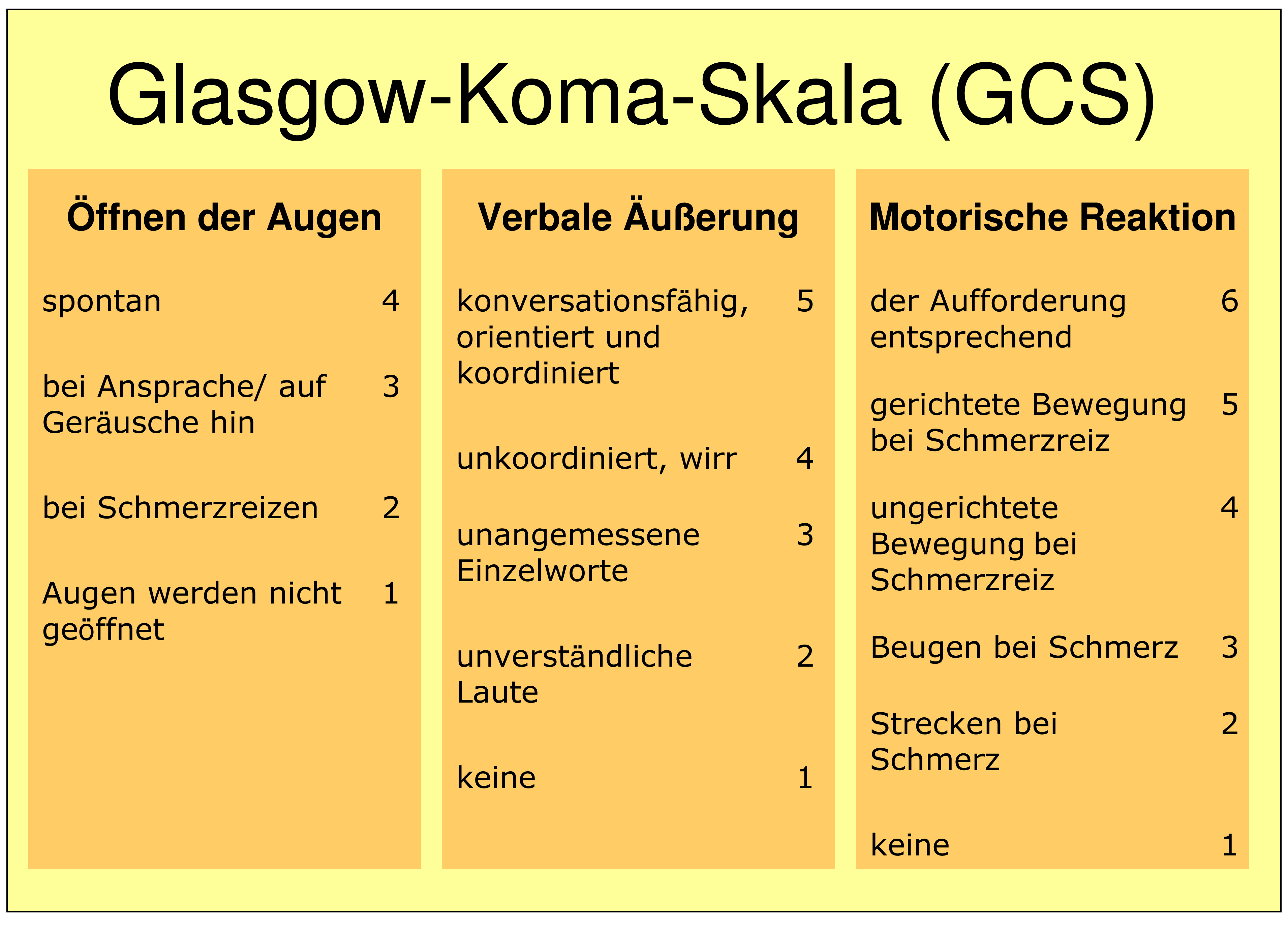
Koma die wichtigsten Basics zur Prüfung
The Glasgow Coma Scale (GCS) is a system to "score" or measure how conscious you are. It does that by giving numbered scores for how awake you are, your level of awareness and how you respond to basic instructions. Experts at the University of Glasgow in Scotland developed the GCS in 1974. Despite " coma " being part of the name, the.
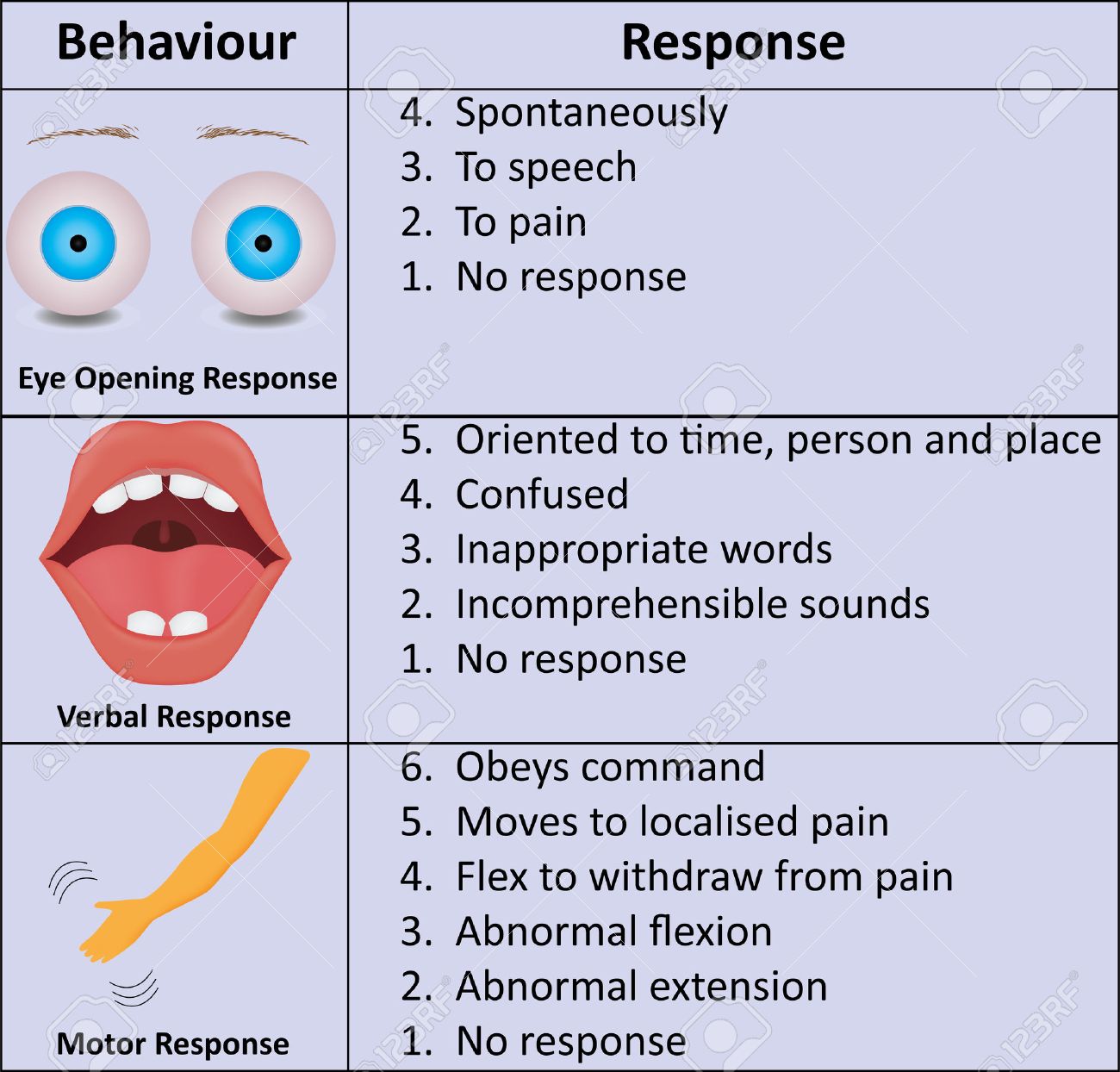
Glasgow Coma Scale Score / Glasgow Coma Scale (GCS) App Ranking and Store Data App As
Background: The Glasgow Coma Scale (GCS) is a tool used to aid in objectively measuring the neurological status of a patient. This study aimed to evaluate the limitations and discrepancies in GCS use among nurses in an academic medical center neurological intensive care unit and compile evidence for development of a standardized GCS educational program.